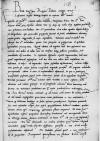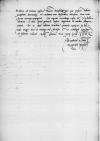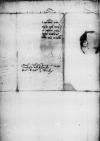Accepimus binas Tuae S(incerita)tis or S(trenuita)tis⌈S(incerita)tisS(incerita)tis or S(trenuita)tis⌉ litteras, ⌊⌋ datas 1527-04-22⌊XXII Aprilis1527-04-22⌋, ⌊⌋ vero 1527-05-06⌊VI Maii1527-05-06⌋ ex ⌊Valle Oleti⌋. Quibus perlectis non potuimus non laudare Tuae S(incerita)tis or S(trenuita)tis⌈S(incerita)tisS(incerita)tis or S(trenuita)tis⌉ patientiam et in rebus agendis dexteritatem et diligentiam, quae cum nobis perspecta fuerint et sunt, studebimus uberiori nostra gratia suggerente se causa rependere.
Dolemus mirum in modum de adversa Tuae S(incerita)tis or S(trenuita)tis⌈S(incerita)tisS(incerita)tis or S(trenuita)tis⌉ valetudine, quam Deo propitio in prosperam et optatam permutari percupimus.
Quod attinet ad negotia nostra, non possumus non mirari, cur nobis et rebus nostris tot technae totque fallaciae parentur, tot simultates obst text damaged⌈[t]t text damaged⌉ruantur. Si caesariani officiales aperte loquerentur vel congruum reportarent responsum, vel nos alia via rebus nostris consultum iri vellemus et ad praesens ab ingerendis ⌊caesari⌋ fastidiis abstineremus. Solutio adohae iam exacta est et hoc factum necessitate urgente excusatur, alias exigetur voluntate percipientis, etiam si iura et consuetudines obstarent. Et quae a principio necessitatis existunt, ex post facto voluntatis fiunt et in sequelam trahuntur.
Proinde hortamur Strenuitatem Tuam nitatur totis viribus a sacra ⌊caesarea maiestate⌋ obtinere vel saltim gratiose, ut ab huiusmodi solutione liberae immunesque reddamur, ne deterioris condicionis nos quam nostri praedecessores videamur.
De ⌊arce Barensi⌋ sumus contentae, quod ad manus ⌊Colae Mariae de Summa⌋ extradatur et nostro nomine consignetur, cum hanc viam faciliorem S(inceri)tas or S(trenui)tas⌈S(inceri)tasS(inceri)tas or S(trenui)tas⌉ Tua arbitretur. Verum quod bellorum turbines in ⌊Italia⌋ in horas excandescunt. Nescimus quomodo ⌊haec arcis⌋ restitutio ad praesens fieri possit. Praestolabimur bellorum eventum, quibus utinam Deus optimus maximusque extremum finem imponat. Et tunc hoc desiderium nostrum exsecutioni demandari curabimus, ut recuperata ⌊arce⌋ in utramque aurem dormire valeamus et Tuam S(incerita)tem or S(trenuita)tem⌈S(incerita)temS(incerita)tem or S(trenuita)tem⌉ ad nos (ut cupimus) revocare.
De litteris obtinendis, ne contra ⌊statum nostrum Barensem⌋ aliquid innovetur, postquam tanta obicitur difficultas, quiescat S(inceri)tas or S(trenui)tas⌈S(inceri)tasS(inceri)tas or S(trenui)tas⌉ Tua et ab earum postulationibus abstineat. De sabellis placet, quod S(inceri)tas or S(trenui)tas⌈S(inceri)tasS(inceri)tas or S(trenui)tas⌉ Tua constituit et id exsequatur.
Accepimus provisionem de civibus Barensibus occisis  BCz, 3465, p. 118 et illam ad ⌊statum nostrum Barensem⌋ transmittimu paper damaged⌈[imu]imu paper damaged⌉s, quo possit debite exaequationi demandari et credimus eam difficulter obtentam. Nam raro corvus corvum oppugnat.
BCz, 3465, p. 118 et illam ad ⌊statum nostrum Barensem⌋ transmittimu paper damaged⌈[imu]imu paper damaged⌉s, quo possit debite exaequationi demandari et credimus eam difficulter obtentam. Nam raro corvus corvum oppugnat.
De negotio ⌊secretarii⌋ nostri etc. id nitatur obtinere S(inceri)tas or S(trenui)tas⌈S(inceri)tasS(inceri)tas or S(trenui)tas⌉ Tua, quod poterit, nostris dignitate et iuribus semper salvis.
De re domini ⌊palatini Siradiensis⌋, quomodo successerit, ex litteris
s(acrae) or s(erenissimae)⌈s(acrae)s(acrae) or s(erenissimae)⌉
⌊maiestatis regiae⌋, domini et coniugis nostri colendissimi, S(inceri)tas or S(trenui)tas⌈S(inceri)tasS(inceri)tas or S(trenui)tas⌉ Tua intelliget.
Quae bene et feliciter valeat.
 BCz, 3465, p. 118 et illam ad
BCz, 3465, p. 118 et illam ad 

